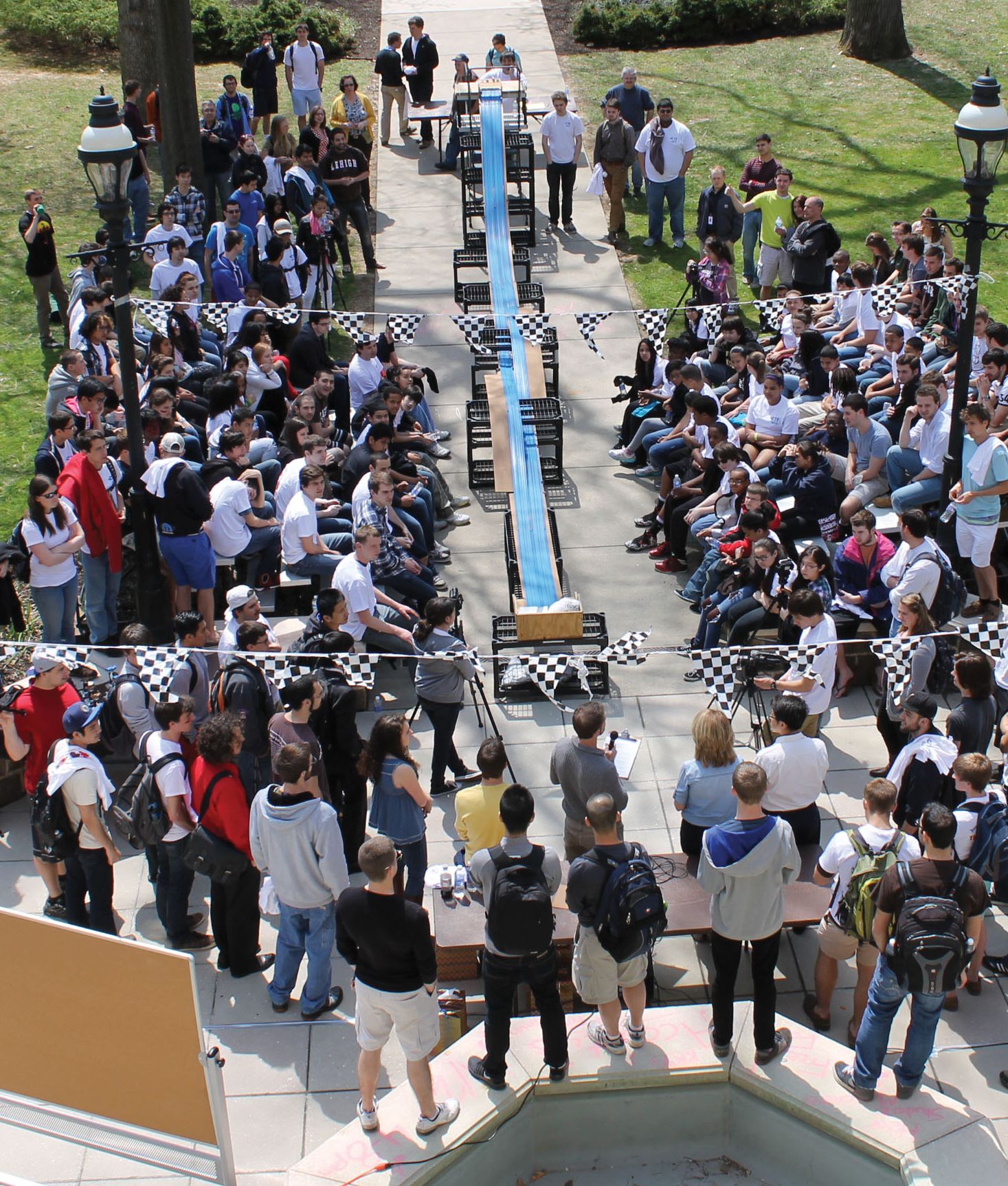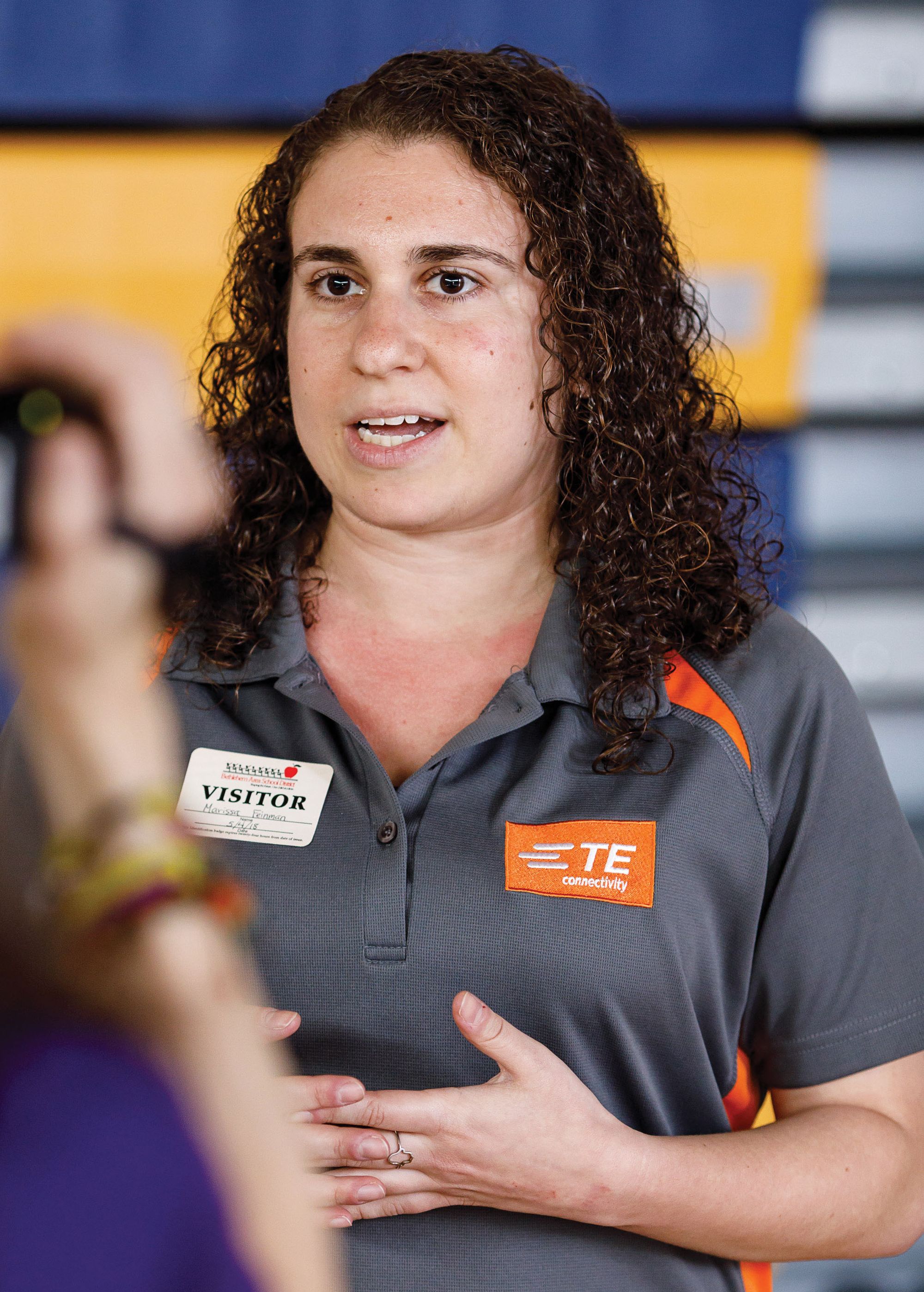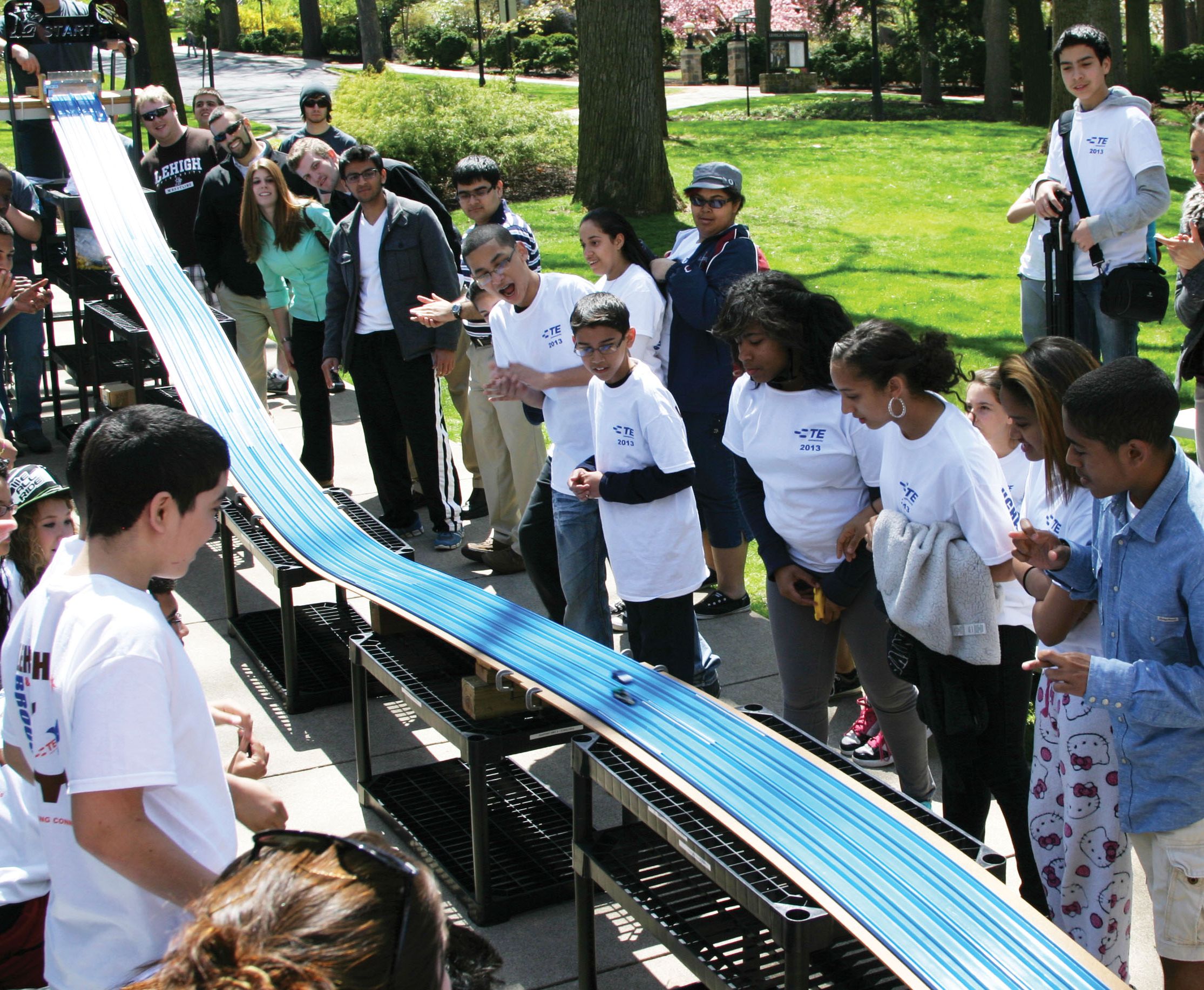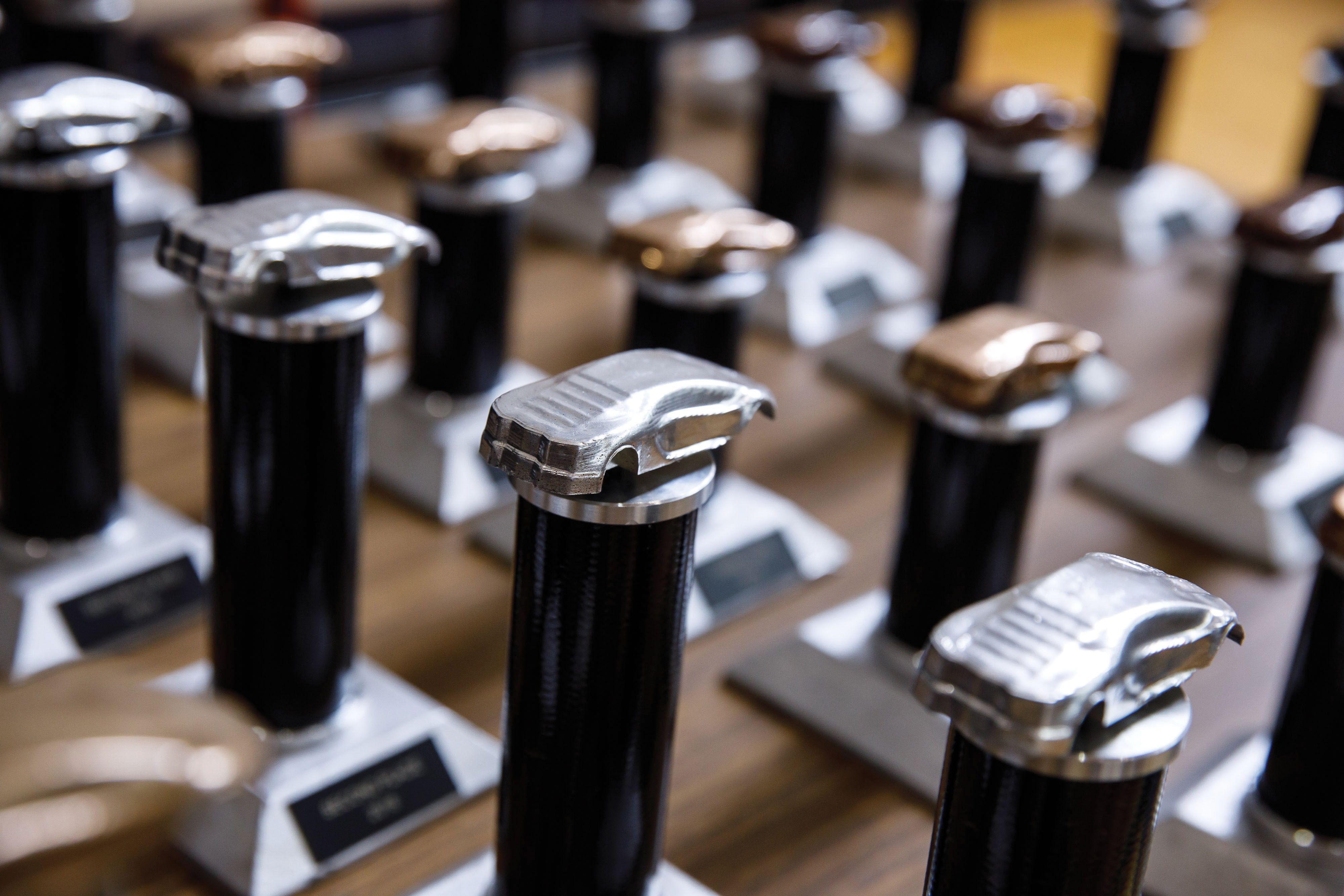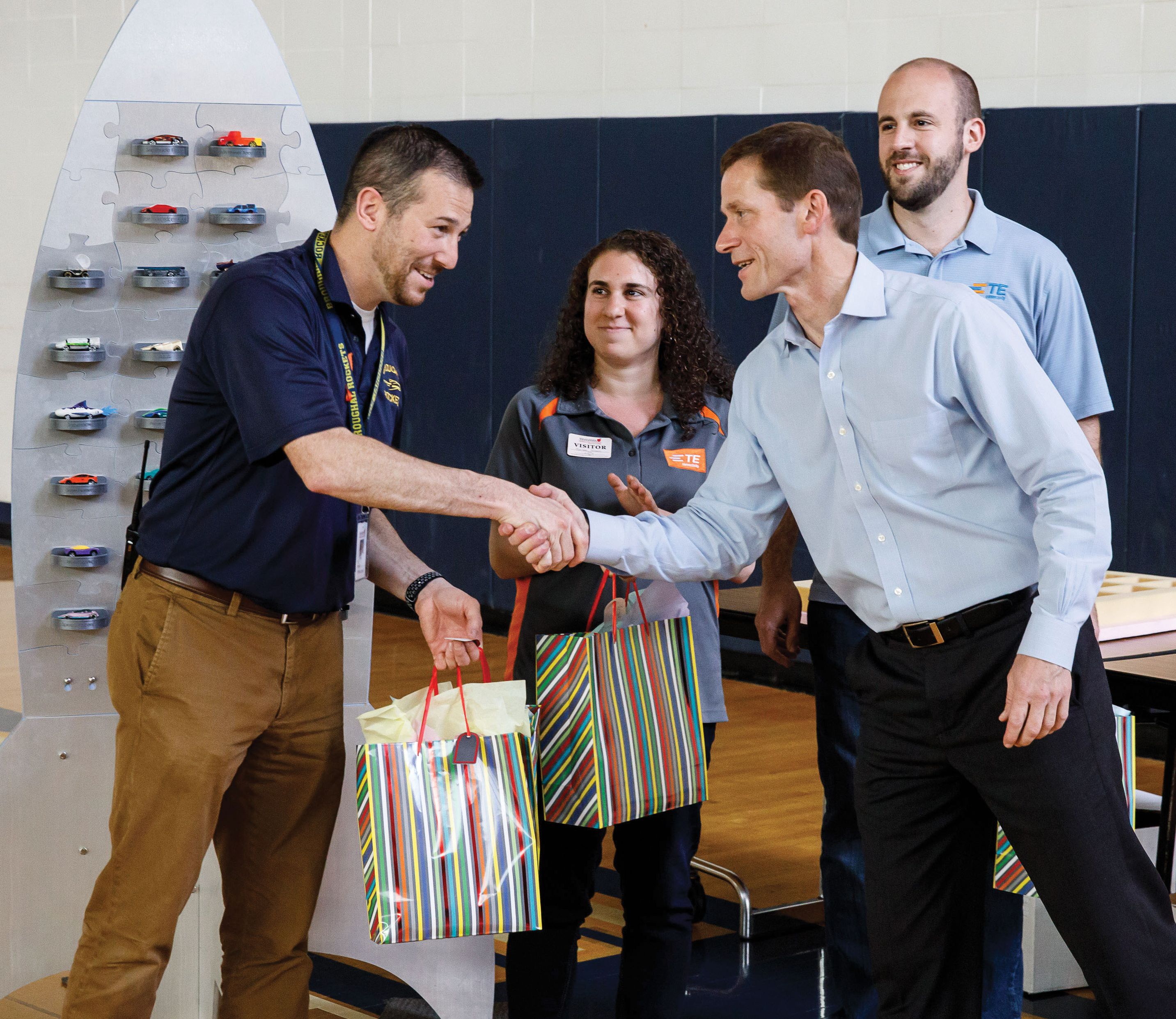As a high school student looking forward to college, Marissa Feinman ‘14 visited Lehigh’s campus on a beautiful springtime day when undergraduates and middle-schoolers from the South Bethlehem community had gathered outside Packard Laboratory, home of the P.C. Rossin College of Engineering and Applied Science. With much fanfare, the group was racing miniature Matchbox-style cars down an undulating track that was set up just outside the building’s main entrance.
Feinman, who went on to earn her Lehigh engineering degree as a proud member of the Class of 2014, eventually developed deep connections to the powerful partnership Lehigh and global industrial technology company TE Connectivity had developed around what appeared to be a springtime frolic for local kids.
For nearly two decades, the collaboration has supported an annual mechanical engineering course, ME 240, and conjured with it myriad benefits for all involved. Little did Feinman realize the race was simply the icing on the cake.
Throughout the Spring semester, the students had worked together to design and fabricate cars. When Feinman arrived on campus on tour day, the course’s festive, culminating event, the TE Connectivity Manufacturing Expo, was in full swing.
“I thought, ‘You get to take a class to make cars and race them? That’s really cool,’” Feinman recalls. “I chose Lehigh’s mechanical engineering major partly because I knew I’d be taking that class.”
The longstanding, innovative, and many-layered relationship between Lehigh and TE Connectivity, a company that designs and manufactures sensor and connectivity solutions throughout the world, made quite the impact upon Feinman’s time at Lehigh—and beyond.
Not only did she take the course, she served as ME240 teaching assistant during her senior year. And through this involvement, she became familiar with the company and later spoke with TE representatives at a job fair.
“It was easy to open the conversation because I’d been through the manufacturing course,” Feinman recalls.
One thing led to another, and a few interviews later she joined the firm as an employee immediately after graduation. Today, she’s working as a product engineer in the company’s Application Tooling business unit.
Cascade of benefits
The Lehigh-TE relationship epitomizes mutual benefits of university-industry collaboration.
“For academic institutions, industry relationships provide interesting, relevant classroom content, and help connect our labs to use-inspired, real needs,” says John Coulter, professor and senior associate dean for research in the Rossin College. “Our relationship with TE helps them develop research, and also gives them direct access to a pipeline of talent.”
“But for Lehigh,” says Jonathan Cummings, director of industry engagement in the Office of Economic Engagement, “the relationship isn’t transactional, merely on the level of, ‘Come fund or hire our students.’ We look to connect the dots between the university and industry partners in terms of recruiting and research, as well as community engagement.”
Which points to another constituency that just may benefit from the relationship even more than Lehigh and TE: students of Broughal Middle School, directly across Packer Avenue from Lehigh’s main campus in South Bethlehem, PA.
In the early 1990s, Coulter developed a course in which local middle schoolers would come up with designs for real objects that undergraduate mechanical engineers would then need to manufacture. Around the same time, he attended a research conference where he met with TE scientists. Shared research interests, especially regarding injection molding techniques, initially brought the two institutions to the table.
As he learned more about TE’s community engagement, Coulter won support for the manufacturing course from the firm’s charitable foundation.
“It’s no secret that exposing adolescents to engineering in a meaningful way changes lives,” he says. “By allowing students to see things differently, particularly kids from disadvantaged neighborhoods, we can also enhance the very future of engineering by welcoming new voices and perspectives into our ranks.”
“TE Connectivity has effectively sponsored a core part of our curriculum, since the early 2000s,” Coulter says. “We are proud of this collaboration, and it’s one that you don’t find all that often in the academic world.”
No set solutions
“For middle school students,” Coulter continues, “the impact of a program like this is huge. We need to develop the next generation of STEM (science, technology, engineering, math) leaders, and we can do that by working directly with kids to inform them about what STEM education is and expose them to what being an engineer is all about.”
Yet for Lehigh, including Broughal students in ME240 isn’t purely magnanimous. They play a vital role in the educational process for Lehigh students—the role of the customer.
“I tell students that when they get to the real world, they don’t get to pick what they manufacture,” says associate chair of mechanical engineering David Angstadt ’87 ’01G ’04 Ph.D., who has taught ME240 since 2009. “The customer decides. Keeping those middle school students happy and engaged gives meaning to the project. The Lehigh students don’t want to let their Broughal teammates down.”
It can be a tall challenge—Lehigh teams never know what their Broughal clientele will request.
“The computer-aided designs Broughal students produce are often based on cartoon or video game characters like SpongeBob SquarePants or Mario,” Angstadt explains. “Each design spawns its own set of engineering challenges.”
Feinman’s team designed a car that looked like a pencil. Another made a hamburger-shaped vehicle, complete with all the fixins. Yet another made a catmobile.
Over the course of each Spring semester, the teams design and create a reverse mold cavity in an aluminum plate that will produce the injection-molded product, with Lehigh students overseeing and handling every step in the process. Steps include determining the car’s orientation on the plate, the pipework configurations that bring material into the cavity, ejecting the car from the mold without damage, and writing code to machine the plate itself.
“All these are open-ended problems without set solutions,” Angstadt says. “Manufacturing limitations may force compromises in the design and shape. Negotiation goes on about what’s possible, and sometimes Broughal students have to accept changes to their original idea. That’s the way it works in the real world.”
On Expo day, though, all is forgiven in a thrum of excitement.
“It’s like a Pinewood Derby on steroids,” Cummings says. For many years, Bobby Gunther Walsh, a Lehigh Valley radio personality who races modified stock cars, has emceed the race. GoPro video feeds capture action at the finish line. Trophies—also manufactured by Lehigh students—are handed out to winners.
“It’s a fun day, and a highlight,” Angstadt says. “But the whole project is expensive from a consumables and equipment standpoint. TE’s support makes it possible, and provides crucial equipment and materials that enable this endeavor while supporting research and learning across the mechanical engineering community at Lehigh. With TE’s help, we are able to provide opportunities we wouldn’t be able to offer otherwise.”
Feinman returns to the Expo as often as her schedule now allows, closing a very long and successful loop that began through a chance encounter during a college tour. She savors the chance to speak to Broughal and Lehigh students, introducing them to TE Connectivity and explaining what it’s like to be an engineer.
“TE Connectivity actively sponsors this event because it connects with what we do, building strong community and fostering education as well,” Feinman says. “Personally, it’s amazing to think how much this program has meant to me. As a high school student, I stumbled into a fun activity during my first ever visit to Lehigh—who would have thought it would have led me this far?”

